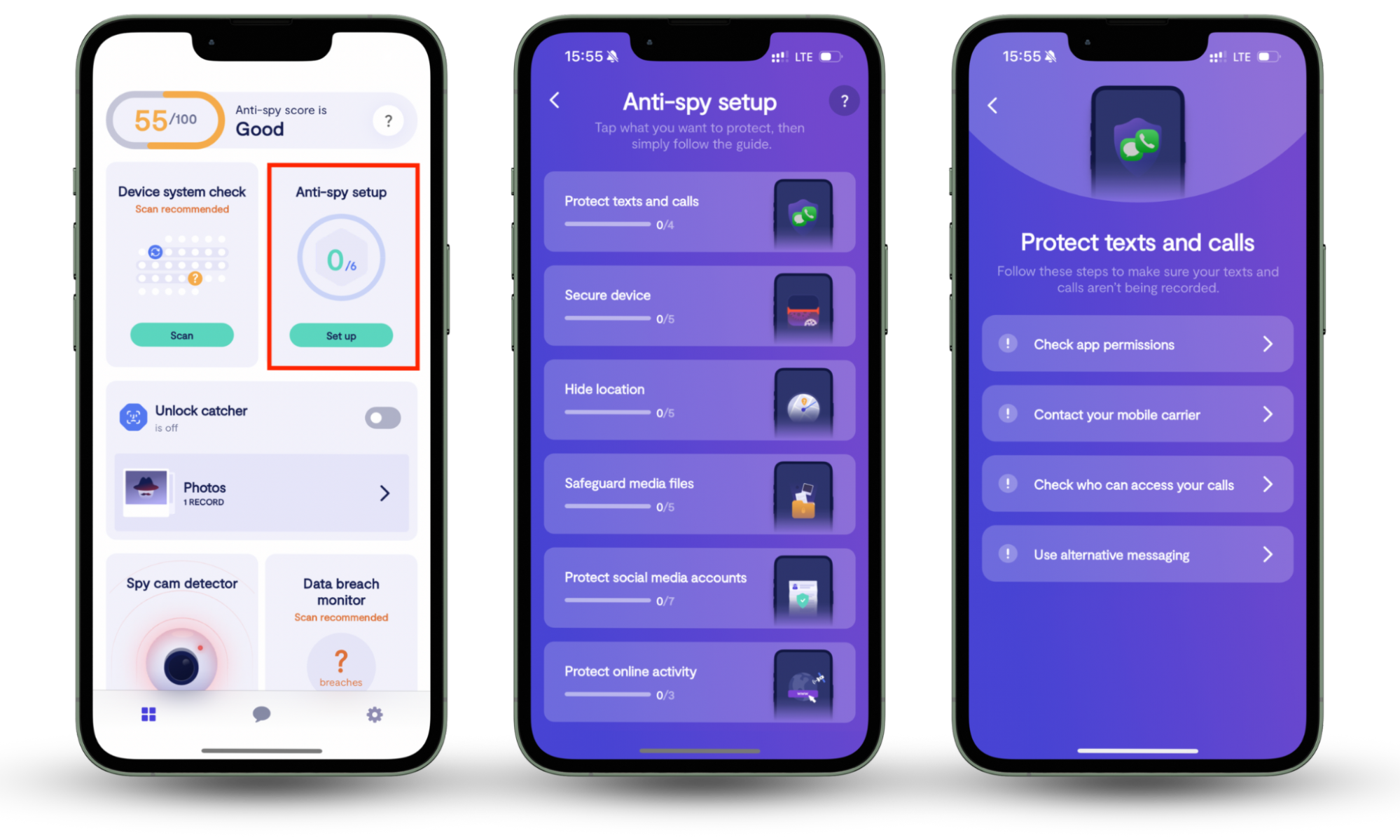Table of contents
- What is trauma bond
- Steps to break trauma bond with narcissist
- 1. Acknowledge and validate bond
- 2. Establish no-contact or low-contact
- 3. Journal and reflect
- 4. Educate yourself
- 5. Set and enforce boundaries
- 6. Build support network
- 7. Prioritize self-care and rediscover identity
- 8. Have plan for safety and independence
- Conclusion
What is trauma bond
A trauma bond is a strong emotional tie that develops through repeated cycles of abuse and affection. It's common in relationships with narcissists and can make people feel trapped, even when it's obvious that the situation is harmful. These bonds can occur not just in romantic relationships but also with friends, family, or at work.
Narcissists—especially in romantic relationships—tend to keep tabs on their partners. If you're concerned about being spied on, Clario Anti Spy can help. It's an anti-spyware app built by cybersecurity experts for iOS and Android devices, and the built-in Anti-spy setup makes it easy to secure your phone and online accounts from spying and stalking.
Here's how to run an Anti-spy setup with Clario Anti Spy:
- Download Clario Anti Spy and subscribe to create an account.
- Tap Set up under Anti spy setup.
- Pick a category—e.g., Secure device—and follow the onscreen instructions.
- Repeat for all other categories within the Anti-spy setup screen.

Clario Anti Spy also includes other useful features to prevent someone from spying on you. For instance, you can run a Hidden app scan to find apps that might be spying on you and enable the Unlock catcher to take a photo of anyone unlocking your phone without your permission.
And if you run into any issues, you can always tap the Messages icon to get support from a security expert 24/7. Clario agents help with all kinds of privacy issues. Here's what one agent had to say about a customer who was worried that his wife was spying on him:
"The client reached out to us with concerns that his phone may have been compromised by spyware, which he suspected had been covertly installed by his spouse. According to the client, his wife seemed to possess an uncanny awareness of his private conversations and whereabouts, leading him to believe that his device was being monitored without his consent. In response, we recommended utilizing our Hidden App Scan feature—a tool specifically designed to detect unauthorized or potentially malicious applications that may be used for surveillance purposes.
Upon initiating the scan, several suspicious applications were flagged by the system. We advised the client to carefully review the list and confirm whether he had knowingly installed any of the detected apps. After his review, he affirmed that he did not recognize or recall downloading the majority of them. Based on this, we provided step-by-step guidance on how to locate and securely remove each of the flagged applications to restore the integrity of the device.
To further enhance his digital privacy, we also recommended adjusting his device’s location settings, including revoking unnecessary permissions from apps that had access to real-time geolocation data. The client expressed sincere gratitude for our support, stating that the assistance brought him considerable peace of mind, and assured us that he would not hesitate to contact us again should he require further help in the future."
Steps to break trauma bond with narcissist
Breaking a trauma bond with a narcissist takes time and effort. Start by acknowledging the bond and limiting contact as much as possible. Journaling can help you see the situation clearly, while learning about narcissistic abuse gives you perspective. Set firm boundaries, surround yourself with supportive people, prioritize self-care, and make a plan to be independent. These actions help build trust in yourself and loosen the grip that the narcissist has on you.
1. Acknowledge and validate bond
It can take months if not years to realize you're in a trauma bond, and that's completely okay. The first step is to accept that the bond is real. If you're reading this, you've likely already started doing that. Acknowledging the bond helps you stay grounded and start figuring out your next steps.
However, don't be hard on yourself for ending up in this situation. It's not your fault. Narcissists are skilled manipulators; even people who understand how they operate can get caught up in their lies.
2. Establish no-contact or low-contact
If it's possible, cut off all contact with the narcissist. This gives you the space to heal without their influence. If you can't—like when kids or work are involved—keep communication to a minimum. Use the grey-rock method, which means giving short, neutral responses, to avoid emotionally feeding them.
If you're not ready to cut ties yet, that's okay, too. Start by building a strong support network and strengthening yourself mentally. This will make setting boundaries easier over time.
3. Journal and reflect
Journaling is a powerful way to process what's happening. It helps you spot patterns you might miss in the moment and brings much-needed clarity. Putting your thoughts and experiences into words can feel grounding, especially when your emotions feel overwhelming.
Writing things down also helps you better understand your feelings. Over time, your journal becomes a reminder of why breaking free is so important.
4. Educate yourself
The word "narcissist" gets tossed around a lot, but true narcissism is a personality disorder. Narcissists manipulate and deceive without empathy, which is what creates the toxic bond.
Trauma bonds themselves are complex and easily misunderstood. The more you learn about narcissistic behavior and trauma bonding, the clearer everything becomes and the stronger you'll feel emotionally.
Educate yourself by reading survivor stories (there are plenty on Reddit) and checking out trusted resources like the Mayo Clinic, American Psychological Association, and Psychology Today.
Good to know
Do narcissists stalk you? In some cases, yes. When you try to set up boundaries, some narcissists may resort to monitoring or intimidation tactics. It's important to understand what stalking means so you can recognize it early and protect yourself.
5. Set and enforce boundaries
Set clear boundaries for what behavior you won't accept—whether that's insults, manipulation, or controlling actions—and communicate them firmly. Sticking to these boundaries protects your emotional space, reinforces self respect, and helps rebuild your self-esteem over time.
Note
If the narcissist has a history of violence or tends to become aggressive when you stand your ground, don't try to do this alone without outside support. Get help from friends, family, or contact the National Domestic Violence Hotline at 1.800.799.SAFE (7233).
6. Build support network
Narcissistic relationships often leave you feeling isolated, so you must rebuild your support network. Surrounding yourself with people who understand and care about you reminds you that you're not alone and gives you the strength to move forward.
Reach out to trusted friends, family members, or even old acquaintances to reconnect. You can also join survivor groups or seek therapy for support and guidance. If you already have a network, then lean on it.
7. Prioritize self-care and rediscover identity
Don't put your well-being on the back burner. Focus on the basics—get enough good sleep, exercise regularly, eat well, and practice mindfulness to stay strong mentally and physically.
At the same time, try reconnecting with hobbies, interests, and passions that you may've lost along the way. These practices help you rebuild your identity and become less independent on the narcissist's influence.
8. Have plan for safety and independence
If you're living with a narcissist, it's crucial to have a clear plan to regain your independence. Start working toward financial stability—get a job or build another income source if you don't already have one, save money, and gather resources to have options when the time comes.
Also, create a safety plan for emergencies. This might include knowing your legal rights, identifying nearby shelters, or having trusted people you can turn to for help. Talking with a psychologist or counselor can also make it easier to work through your concerns and create a solid strategy.
If you're worried about being stalked after ending the relationship, prepare ahead of time. Our guide on how to know if someone's stalking you provides practical safety tips and steps you can take to protect yourself.
Conclusion
Breaking a trauma bond with a narcissist is tough, but it's completely possible. Be patient with yourself and show self-compassion. Healing takes time and isn't always a straightforward process.
Keep learning, lean on your support network, and make self-care a priority. Walking away from the narcissist gives you the freedom to build a healthier, more authentic life.
And don't overlook your privacy. Install Clario Anti Spy, run an Anti-spy setup, and take advantage of other features like Hidden app scan and Unlock catcher to make sure you aren't being monitored.


